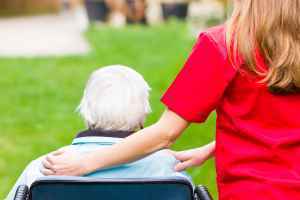Assisted Living in Massachusetts
The Commonwealth of Massachusetts is a vital and vibrant center of senior life in America. The state's population has manifested just over 5% growth since 2010, and the second-fastest-growing demographic represented in that growth is adults aged 65 and over, who represent just over 16% of the population after that total increase, according to the US Census Bureau's statistics. Host to innumerable historic New England cities and towns, not least among them the great metropolitan cultural and economic center of Boston, the state is nevertheless no stranger to rural charm and outdoor recreational pursuits, with golf being a particular favorite. Along with its temperate climate and superb health care system, it's little wonder that Massachusetts boasts a sizable population of seniors and retirees.
Assisted living in Massachusetts takes place in assisted living residences (ALRs), which cost a median average of $5,640 per month. Although this is significantly higher than the national average of $4,051, the state provides plenty of financial support and a diverse selection of options for seniors looking for assisted living solutions.
This guide provides detailed information about the cost of assisted living in Massachusetts compared to that of its neighboring states, along with guidance about the rules and regulations that govern ALRs and free information and resources for financing and general information. It also covers other factors that attract older adult residents, such as the overall quality of living and general pros and cons for the senior set.
SeniorAdvice's Guide to Assisted Living in Massachusetts
A state's SeniorScore is calculated based on over 100 variables, with the final score assigned on a linear curve and the overall goal being to identify the particular pros and cons of senior living in any given region. Massachusetts' SeniorScore is an impressive 74%, just above the national average of 72%.
SeniorScore™ for Massachusetts
 The SeniorScore™ is calculated based on over 100 variables, some of which are shown below. The final score is curved based on a linear curving method. For More info visit senioradvice.com/seniorscore.
The SeniorScore™ is calculated based on over 100 variables, some of which are shown below. The final score is curved based on a linear curving method. For More info visit senioradvice.com/seniorscore.
- Massachusetts's SeniorScore™ of 74 is higher than the national average of 72.
- Massachusetts has very high access to Medicare registered healthcare providers.
- Massachusetts has a high number of hospitals within the state.
- Massachusetts has a very high number of senior living facilities within the state.
- Massachusetts has a very high number of home healthcare providers operating in the state.
- The average life expectancy in Massachusetts is 80.5, compared to the national average of 78.6.
- Massachusetts has an average overall property crime rate compared to national averages.
- Massachusetts has an average overall violent crime rate compared to national averages.
- 29% of the population in Massachusetts are seniors, compared to 29% nationally.
- Massachusetts has 352 golf courses in the state.
- Massachusetts has an average number of municipal parks throughout the state.
- Massachusetts has 1,955 churches in the state.
- The property taxes average 4.04% of total income in Massachusetts, which is significantly higher than the national average of 2.79%.
- The property taxes average 1.01% of property value in Massachusetts, which is lower than the national average of 1.09%.
- The average sales tax in Massachusetts is 6.25%, which is significantly lower than the national average of 6.97%.
- The average state income tax in Massachusetts is 4.74%, which is significantly higher than the national average of 3.38%.
- The mean household income in Massachusetts is $89,285, which is significantly higher than the national average of $64,580.
- Massachusetts's median household income is $70,742, which is significantly higher than the national average of $51,560.
- The average per capita income in Massachusetts is $35,062, which is significantly higher than the national average of $25,611.
- Assisted living costs in Massachusetts average $64,793 per year, which are significantly higher than the national average of $42,700.
- Nursing home costs in Massachusetts average $142,680 per year, which are significantly higher than the national average of $92,481.
- Costs for adult daycare in Massachusetts average $15,411 per year, which are significantly lower than the national average of $17,931.
- Costs for home healthcare in Massachusetts average $56,658 per year, which are significantly higher than the national average of $46,197.
- The unemployment rate is about 8.14% in Massachusetts, which is lower than then national rate of 8.26%.
- The overall cost of living in Massachusetts is very high compared to national averages.
- 0.50% of the senior population in Massachusetts are financially responsible for at least one grandchild.
- Massachusetts receives an average of 45.1 inches of rain per year.
- Massachusetts has an average annual temperature of 48.9 degrees fahrenheit.
- Massachusetts has an average low temperature of 38.7 degrees fahrenheit.
- Massachusetts has an average high temperature of 58.1 degrees fahrenheit.
- Massachusetts has an average population density of 2,287 people per square mile.
- Massachusetts has a very high public school quality ranking.
- Massachusetts has a very high public school safety ranking.
- Massachusetts has a high graduation rate of 88.74%.
Massachusetts has relatively high rates of taxation and a high cost of living, which are amply compensated by superb access to world-class health care facilities, significant financial supports for assisted living and other forms of senior care and a diverse selection of elder care facilities and programs. All of these factors contribute to making it an attractive destination for retirees.
Massachusetts enjoys largely temperate weather, an excellent standard of overall education and relatively low crime rates, all of which contribute to quality of life. Not only are its health care facilities world-class, but it also bolsters this appeal further with a cutting-edge home health provider market.
Almost a third of Massachusetts' population are seniors, on track with the national average and contributing to a solid infrastructure of senior services. The state also sports strong spiritual services, with almost 2,000 churches across the state.
Top Assisted Living Facilities in Massachusetts
Charlton Manor Rest Home is a senior housing facility located at 12 Town Farm Rd in Charlton, Massachusetts. The encompassing area has an average population density, with roughly 14,000 people residing in the 01507 zip code. With a ...
Wingate at Reading is a 123 unit senior housing facility located in Reading, Massachusetts. The facility is in a primarily affluent area, with a median family income of $103,358. With around 25,000 individuals living in the zip ...
Life Care Center of Stoneham is a 94 bed senior housing community. It is located at 25 Woodland Rd in Stoneham, Massachusetts. The encompassing area is densely populated, with approximately 22,000 individuals residing in the 02180 zip code. ...
Blaire House of Milford is a 73 unit senior housing community located in Milford, Massachusetts. The surrounding area is densely populated, with approximately 29,000 individuals residing in the zip code of 01757. It is a largely middle income ...
Life Care Center of Acton is a 155 bed senior care facility. It is situated nearby the West Concord area of Acton, Massachusetts. With around 22,000 individuals living in the 01720 zip code, the encompassing area has a ...
Palm Center is located at 40 Parkhurst Rd in Chelmsford, Massachusetts. It is a 124 unit senior community. The encompassing area has a dense population, with about 26,000 individuals residing in the zip code of 01824. It ...
Prescott House is located at 140 Prescott St in North Andover, Massachusetts. It is a 126 bed senior care facility. The facility is in a predominantly well-to-do area, with a median per-family income of $99,505. It is ...
Blaire House of Tewksbury is a 131 unit senior community situated in Tewksbury, Massachusetts. The community is in a largely upscale area, with a median family income of $83,976. It is heavily populated, with around 30,000 individuals residing ...
Courtyard Nursing Care Center is situated near by the North Cambridge neighborhood of Medford, Massachusetts. It is a 224 unit nursing home facility. The community is in a predominantly middle class area, with a median household income of ...
Located at 30 Watertown St in Lexington, Massachusetts, Pine Knoll Nursing Center is an 81 unit nursing facility. The surrounding area has a medium-density population, with approximately 15,000 individuals living in the zip code of 02420. It is ...
Meadow Green Rehabilitation and Nursing Center is a 123 bed nursing home facility. It is located at 45 Woburn St in Waltham, Massachusetts. With an average household income of $59,067, the facility is in a generally middle income ...
Colonial Rehabilitation and Nursing Center is a 205 unit nursing care facility situated in the Central Weymouth neighborhood of Weymouth, Massachusetts. The neighboring area has a medium-density population, with about 16,000 individuals residing in the zip code of 02188. ...
Located near by the North Scituate area of Scituate, Massachusetts, Life Care Center of The South Shore is a 117 room senior housing facility. The encompassing area has a medium-density population, with approximately 19,000 residents in the zip code ...
Country Center For Health and Rehabilitation is a 111 room nursing care facility. It is located at 180 Low St in Newburyport, Massachusetts. The surrounding area has an average population density, with around 18,000 individuals living in the ...
Wingate at Haverhill is located at 190 North Ave in Haverhill, Massachusetts. It is a 127 unit senior housing facility. With around 26,000 individuals living in the 01830 zip code, the neighboring area is densely populated. ...
West Revere Health Center is located at 133 Salem St in Revere, Massachusetts. It is a 140 unit skilled nursing facility. The neighboring area is heavily populated, with around 53,000 individuals residing in the zip code of 02151. ...
Wingate at Chestnut Hill is a 135 unit senior community. It is situated around the Brighton neighborhood of Chestnut Hill, Massachusetts. The community is in a generally upscale area, with an average household income of $130,044. With ...
Located at 969 Park St in Attleboro, Massachusetts, Life Care Center of Attleboro is a 123 bed senior community. With an average family income of $67,398, the community is in a largely middle income area. It is densely ...
Located at 136 Boston Post Rd in Sudbury, Massachusetts, Wingate at Sudbury is a 41 bed senior care facility. The encompassing area has a medium-density population, with approximately 19,000 individuals residing in the zip code of 01776. ...
Maristhill Nursing and Rehabilitation Center is located at 66 Newton St in Waltham, Massachusetts. It is a 123 unit nursing home facility. With a median family income of $59,067, the community is in a mostly middle income area. ...
The Cost of Assisted Living in Massachusetts
Assisted living is somewhat expensive in Massachusetts, costing a median average of $5,640 per month, well above the national monthly average of $4,051. It's still relatively close in average expense to some nearby states, however. Rhode Island is only slightly less expensive at $5,199 per month, and Maine likewise at $5,169, while assisted living in Vermont averages $5,338 per month. New Hampshire and New Jersey are considerably pricier at $7,021 and $6,400 per month, respectively. On the other hand, some of Massachusetts' neighbors are more affordable by comparison: Connecticut runs to $4,880 per month, while the State of New York averages a surprising low of $4,630 monthly. The overall picture puts Massachusetts around the middle of the pack as its regional neighborhood goes, but all states in the region come in above the national average.
- Massachusetts: $5,640
- United States: $4,051
- New Hampshire: $7,021
- New Jersey: $6,400
- Vermont: $5,338
- Rhode Island: $5,199
- Maine: $5,169
- Connecticut: $4,880
- New York: $4,630
The Cost of Assisted Living in Massachusetts' Top Cities
Costs of assisted living in Massachusetts' municipalities tend to range from just under to well over the state average. Among the Commonwealth's top cities, the most expensive locale is Lowell at $7,182 per month, while the least expensive major city is New Bedford at $5,199 monthly. The metropolitan area of Boston is toward the pricier end of the scale at $6,442 per month, roughly level with New Jersey's overall state average. Worcester is very close to the Massachusetts average at $5,634 monthly, and Springfield comes in toward the cheaper end of the overall range at $5,350 per month.
- Boston: $6,442
- Worcester: $5,634
- Springfield: $5,350
- Lowell: $7,182
- New Bedford: $5,199
Senior Care Cost Comparison in Massachusetts
Among the United States' five main categories of senior care, the average monthly costs can vary radically. By far, the cheapest option is adult day care, with an average monthly cost of $1,473. In-home care costs $5,186 per month, and home health care runs to an average of $5,243, both slightly less expensive than assisted living. The most expensive option is nursing home care, which averages $12,473 per month. Overall, assisted living is roughly in the middle of the cost spread.
- Assisted Living: $5,640
- In-Home Care: $5,186
- Home Health Care: $5,243
- Adult Day Care: $1,473
- Nursing Home Care: $12,473
Financial Assistance for Assisted Living in Massachusetts
Group Adult Foster Care (GAFC)
Phone Number: (800) 841-2900 (MassHealth Customer Service), (800) 243-4636 (Executive Office of Elder Affairs)
Website: mass.gov/orgs/executive-office-of-elder-affairs
Group Adult Foster Care is a Medicaid program administered by MassHealth and the Executive Office of Elder Affairs. It allows qualified applicants who are already MassHealth recipients to receive funding for personal care in an assisted living residence. This program is subject to specific income and asset requirements; details about eligibility and identification of GAFC-approved residences can be found by contacting the EOEA or the customer service line at MassHealth.
Social Security SSI-G Supplement
Phone Number: (800) 772-1213
Website: ssa.gov/ssi
Individuals who receive Supplemental Security Income (SSI) and are eligible for the Group Adult Foster Care program may also qualify for the SSI-G supplement. Unlike GAFC, the SSI-G supplement does provide direct funding for housing expenses over and above the costs of personal care. Applicants can contact the Social Security Administration at the toll-free number above, consult their website and make use of the BEST benefits screening tool online to determine whether they're eligible for this supplement.
Aid and Attendance Pension (A&A)
Phone: (800) 827-1000
Website: mass.gov/info-details/aid-and-attendance-aa-and-housebound-benefits
Available through Veterans Affairs and the Massachusetts Department of Veterans Services (MDVS), the Aid and Attendance pension is a benefit specifically designed for veterans who are unable to perform activities of daily living, are bedridden with chronic illness or have reduced visual acuity. One of the forms of care these pensions can pay for are assisted living residence costs. Eligibility requires completing an application that includes a medical exam and other assurances that the applicant meets at least one of the qualifying medical conditions.
Massachusetts Assisted Living Rules and Regulations
Assisted living facilities in Massachusetts are called Assisted Living Residences (ALRs) and are regulated by the Executive Office of Elder Affairs (EOEA). There are very strict and detailed standards for ALRs to acquire and maintain certification from the EOEA, and it's not permitted to open an ALR without such certification or at least being in the process of acquiring it (and publicly disclosing that the facility is still in that process). A guide to these requirements can be found in PDF format online.
Scope of Care | Assisted Living Residences in Massachusetts must be certified by the Executive Office of Elder Affairs as meeting stringent requirements, including detailed staffing, operation and facility maintenance and improvement plans and emergency response plans. They may support activities of daily living (ADLs), such as bathing and dressing, as well as instrumental activities of daily living (IADLs), such as housekeeping and laundry services. They may also support health services, such as self-administered medication management (SAMM) and skilled and special care as residents' service plans require. Optional services include medical and recreational transportation, barber and beauty shop services and money management. |
Care Plan Requirements | An ALR is required to develop a residential service plan with prospective residents and/or their legal representatives and sponsors. The plan needs to spell out service requirements, including a minimum service package and must be laid out in writing, dated and signed by the resident (or a representative) and a sponsor. |
Medication Management Requirements | ALRs must provide detailed policies for medication management and self-administered medication management that clearly lay out residents' rights and staff responsibilities. Limited medication administration policies, which allow medication to be administered only by certain specified individuals, need to be provided where pertinent to a resident's service plan. |
Staff Requirements | Staff must clear a background check and cannot be employed at an ALR if they have a felony conviction. As part of the certification process, the ALR must have a plan in place to keep staffing levels adequate, not only to support residents' service plans on a day-to-day basis but also to deal with unforeseen contingencies and emergencies. Management, service coordinator and other administrative positions need to be filled by experienced individuals who are at least 21 years of age. |
Staff Training Requirements | Staff must be trained as appropriate to their positions and duties in a curriculum of general, personal care and special care training, whose hours and course content are designated by the EOEA, and need to undergo ongoing in-service training and education. |
Medicaid Coverage | ALRs that are certified under the Group Adult Foster Care program (GAFC) are required to accept Medicaid payment for personal care services, and some may also support SSI-G payments for room and board costs. It's incumbent on the resident to verify that a given ALR supports these methods of payment since not all are required to do so. |
Reporting Abuse | In order to keep its certification, an ALR is required to fully cooperate with the Assisted Living Ombudsman in the prevention of abuse and neglect, the investigation of any complaints and the proactive creation of plans to reduce the risk of harm to residents. Full documentation of any incident involving a resident — including the specific issue, the date and time of the occurrence and any actions taken or refused — is also a requirement. |
Free Assisted Living Resources in Massachusetts
Assisted Living Ombudsman
Long-term care Ombudsman programs are focused on ensuring dignity and quality care for seniors, preventing abuse and neglect and ensuring the highest possible quality of care. Massachusetts has a specialized Ombudsman program for assisted living, which advocates for seniors in assisted living facilities, and can both investigate and mediate complaints brought by a resident against such a facility.
Contact: The office of the Assisted Living Ombudsman can be reached by phone at (617) 727-7750.
Massachusetts Agencies
Executive Office of Elder Affairs (EOEA)
Address: One Ashburton Place, 5th floor, Boston, MA 02108
Phone Number: (617) 727-7750
Website: mass.gov/orgs/executive-office-of-elder-affairs
The Executive Office of Elder Affairs runs a range of programs focused on helping seniors in the state enjoy dignity, independence and the best possible quality of life. One of the most important of the programs the office administers is the SHINE Program (Serving the Health Insurance Needs of Everyone), which provides free health insurance information and counseling to Medicare recipients. The Commonwealth of Massachusetts also offers a general information page on assisted living, and the EOEA administers the Assisted Living Ombudsman program.
Area Agencies on Aging in Massachusetts
There are dozens of Area Agencies on Aging in Massachusetts. They strive to provide unbiased guidance for seniors, caregivers and families on issues related to aging and appropriate service referrals in the state. AAA staff can help with applications, assessments and care coordination. Local offices can be found through an online directory.
Massachusetts Department of Veterans' Services (MDVS)
Veterans Service Officers (VSOs) in Massachusetts are responsible for providing a wide variety of outreach services and assistance to veterans, including help with applying for Aid and Attendance pensions that offset the costs of assisted living and other forms of long-term care. Access to VSO counseling and other information resources is provided by the Massachusetts Department of Veterans' Services through the MassVetsAdvisor.org online portal. The MDVS can be reached by phone at (617) 210-5480.
Social Security Offices in Massachusetts
Social Security offices administer Supplemental Security Income (SSI) payments for millions of Americans every month. Massachusetts residents aged 65 and over may be eligible if they meet specific income and resource criteria. Having this eligibility can be important to securing other forms of financial assistance for assisted living. Local offices in Massachusetts can be located online.
Other Cities in Massachusetts


 The SeniorScore™ is calculated based on over 100 variables, some of which are shown below. The final score is curved based on a linear curving method. For More info visit
The SeniorScore™ is calculated based on over 100 variables, some of which are shown below. The final score is curved based on a linear curving method. For More info visit 



















 Your Information is Processing
Your Information is Processing